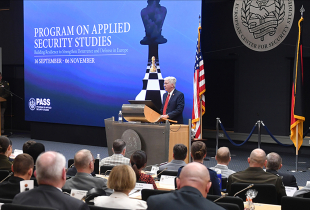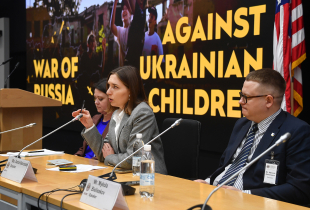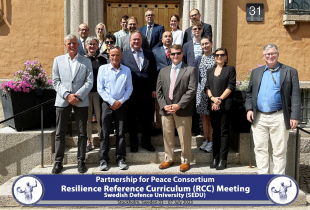
Abstract
This book examines theoretical and practical aspects of ensuring national resilience in a changing and uncertain security environment. An interdisciplinary theoretical basis is provided for the development of practical tools to build an effective system of national resilience. It identifies patterns and interactions within the system of national security with particular focus on adaptive management techniques and formation of system connections used to enhance national resilience. The book offers a wide overview of existing national resilience practices in the world in terms of their applicability to Ukraine. And, develops recommendations as to the conceptual framework and model for ensuring national resilience in Ukraine, development and implementation of a comprehensive national security and resilience policy, improvement of relevant legislation of Ukraine, and more. The book contains a theoretical substantiation of the building of a system of national resilience in Ukraine, in which the author took an active part.
The book is intended for subject matter experts, scholars, specialists in the field of national security, decision-makers, public officials, representatives of public organizations, and anyone interested in the topic of national resilience, including for the purposes of developing national resilience related policies, rules, and regulations.
Preface
The appearance of this book translated into English was the result of unpredictable changes in the security environment in Ukraine. This book was completed in Ukrainian before Russia invaded Ukraine on February 24, 2022. We had many plans to promote it, but the war interfered. Therefore, I reached out to colleagues at the George C. Marshall European Center for Security Studies through the GCMC Alumni Network. They kindly agreed to help me with the translation and promotion of the book outside of Ukraine. This is a vivid example of resilience in action. All of us were able to respond quickly to the rapidly changing security situation in Ukraine and turn negative consequences of the war into positive results in the form of our common project.
Some years ago, national resilience was a buzzword, as well as hybrid threats. Many experts and politicians proposed different measures and projects in various spheres aimed at enhancing national resilience. Most people did not understand what these different proposals have in common and why they all referred to the one point of reference. National resilience was a new direction in Ukrainian public policy as well as in science. Thus, we needed a common language in the field of national resilience. This required a deep study of this phenomenon, its nature, roots, and manifestations in the field of national security.
My research is based on three theoretical pillars – complex systems theory, security studies, and sustainable development studies. It is not easy to translate a scientific book, especially if it is associated with a specific academic culture and national tradition. Thus, you can find some unusual terms in my book, but it is not always due to translation difficulties.
I use the term national resilience ensuring system, rather than national resilience system, which is more familiar because I wanted to underline a specific phenomenon that makes a complex system work. I would like to explain this with a simple example. There is a car, which is a complex technical system. It has an ability to move fast, but it cannot do it without a driver. A driver has relevant knowledge and skills to drive. Proper interaction between a driver and a car creates a new complex system with a new ability to work effectively. Now our car can move fast. Thus, the national resilience system is a “car” – just a set of elements. Its ability to function correctly comes from the proper organization of system links and connections among different actors, the effective and adaptive management of the system, and the implementation of general and specific mechanisms, measures, and appropriate methodological tools for providing resilience of the state and society.
Using the term national resilience ensuring system, I would like to emphasize the important processes, which make it possible to achieve the main aim of this system functioning and fulfill its main mission. This implies forming the ability of the state and society to effectively counter threats of any origin and nature, adapt to rapid changes in the security environment, function continuously, including during crises, and quickly recover after crises to the optimal equilibrium. So, in practice, I focused on how to organize national resilience system, which works effectively: how to arrange proper system management at various levels in the state (national, regional, community) and whole-of-society interaction in this field.
My research was completed almost a year ago and takes into account Russia’s hybrid war in Ukraine, which began in 2014, the spread of COVID-19, and countering them. Ongoing Russia’s invasion and full-scale war in Ukraine have confirmed the conclusions made in the book about the resilience of the Ukrainian state and society, especially about the strong self-organization and self-governance potential of our society. A vivid example is a strong volunteer movement in Ukraine. I underlined in the book that building the national resilience means not only enhancing the crisis management in the state, but also the strengthening societal, economic, and community resilience.
In addition, extensive trainings and exercises were organized for public authorities and representatives of the national security and defense sector in Ukraine in previous years. As a result, the preparedness and readiness of the Ukrainian state and society to respond armed aggression have increased significantly. This distinguishes substantially the current situation from the one in 2014. The leadership of the President of Ukraine should also be considered a powerful asset that not only enhances the effective defense of Ukrainian forces against the overwhelming forces of the enemy but equally strengthens the international coalition of democracies in support of Ukraine. Leadership is a powerful driver for building national resilience.
My research proved that Ukraine was interested in and invested in sustainable development, good governance, an efficient economy, and progressive knowledge, not war. At this time, nobody knows how and when this war will end. Nevertheless, Ukraine continues to be resilient, adapt to wartime conditions, and think about future developments in the post-war period even in the darkest hours.
There are many other issues in the field of national and international security and resilience worth further research. We are facing the destruction of the global security system created after the Second World War and the weakening of the influence of international organizations that must ensure compliance with international law. These global processes have reduced the effectiveness of existing crisis regulation, devalued security guarantees provided to various states, and provoked new interstate conflicts and international crime in the absence of an effective global system of deterrence and punishment.
Russia’s encroachment on the sovereignty and territorial integrity of neighboring states, especially Georgia, Moldova, and Ukraine, has been observed for many years. However, the response of international organizations responsible for global peace and security to Russia’s violations of international law and manipulation of democratic values has so far been extremely weak. The policy of appeasing the aggressor and symbolic sanctions did not hinder the Kremlin’s aggressive plans, which later led to the expansion of the format of Russia’s aggression.
The inefficiency of the global security system was especially dangerous for Ukraine. In particular, Russia, a nuclear-weapon state and a permanent member of the UN Security Council, launched a war against Ukraine, which once had renounced nuclear weapons in exchange for international security assurances. As it has become clear, there are no effective international mechanisms to prevent or end the war at an early stage. Does this mean that all countries should strengthen their defense capabilities? What would be the price of this decision for economic and human development?
The example of Russia’s war against Ukraine shows the inefficiency of a number of international organizations and their structural units, including the UN Security Council, the International Committee of the Red Cross, OSCE, International Atomic Energy Agency, etc., which have failed to address complex security and peace issues. This leads to the need to check the effectiveness of these international organizations and reform them.
I assume that a number of new military and/or political alliances will be formed in the world after the war in Ukraine in a formal or informal manner. They will be smaller but more flexible and will be able to offer their members more effective security guarantees. As an independent state, Ukraine has the right to participate in various systems or alliances of collective security and defense as a way to guarantee its own state sovereignty and territorial integrity.
The need to find a solution to end Russia’s war in Ukraine and provide the state with reliable external security guarantees can be a driver to restructure the obsolete and inefficient system of global security and its institutions. At the same time, it is clear, that the path to reform such institutions will be difficult and long.
The current security environment is characterized by a high degree of volatility and uncertainty. The dramatic events taking place in the world today test the strength and viability of existing peace and security mechanisms, the effectiveness of international organizations and alliances in practice. Strengthening national resilience can be an effective response to current challenges.
I am sincerely grateful for the support of my book translation and promotion to the leadership and staff of the George C. Marshall European Center for Security Studies (Garmisch-Partenkirchen, Germany). I express special gratitude to Karen Finkenbinder, Ericka Flanigan, and Jean Kramer for their support and perfect organization of the teamwork, and to everyone who provides technical support and helps me to present my book to a large audience of readers outside Ukraine.
-Olga Reznikova,
Kyiv, Ukraine
June 2022
About the Author
Dr. Olga Reznikova is the head of the Strategic Planning Research Department at the National Institute for Strategic Studies (Kyiv, Ukraine). She holds her Ph.D. in economics and finance. Dr. Reznikova is an Honorary Economist of Ukraine (2008) and a Senior Research Fellow (2014).
Dr. Reznikova worked in the Ministry of Finance of Ukraine, she was a staff member of the National Security and Defense Council of Ukraine. Since 2010 she has been working at the National Institute for Strategic Studies (NISS).
As the first scholar in Ukraine to initiate a study of national resilience, Dr. Reznikova has authored a wealth of scientific and analytical publications on this subject matter. She has prepared analytical materials on ensuring national security for the President of Ukraine, the National Security Council of Ukraine, the Cabinet of Ministers of Ukraine, and has contributed to the development of draft regulatory documents of Ukraine, which have been implemented, including the National Security Strategy of Ukraine (2015, 2020), the Concept of National Resilience System (2021), the Law on National Security of Ukraine (2018), etc.
Dr. Reznikova scientific research interests report on national security and resilience, strategic analysis and forecasting in national security fields, methodology for risks assessment, crisis management, combating hybrid threats, security and resilience culture, education in national security and resilience sphere, global development and international security. She is the author of more than 70 scientific papers.
The George C. Marshall European Center for Security Studies
The George C. Marshall European Center for Security Studies in Garmisch-Partenkirchen, Germany is a German-American partnership and trusted global network promoting common values and advancing collaborative geostrategic solutions. The Marshall Center’s mission to educate, engage, and empower security partners to collectively affect regional, transnational, and global challenges is achieved through programs designed to promote peaceful, whole of government approaches to address today’s most pressing security challenges. Since its creation in 1992, the Marshall Center’s alumni network has grown to include over 15,000 professionals from 157 countries. More information on the Marshall Center can be found online at www.marshallcenter.org.
The views expressed in this publication are those of the author(s) and do not necessarily reflect the official policy or position of the George C. Marshall European Center for Security Studies, the U.S. Department of Defense, the German Ministry of Defense, or the United States, German, or any other governments. This report is approved for public release; distribution is unlimited.


